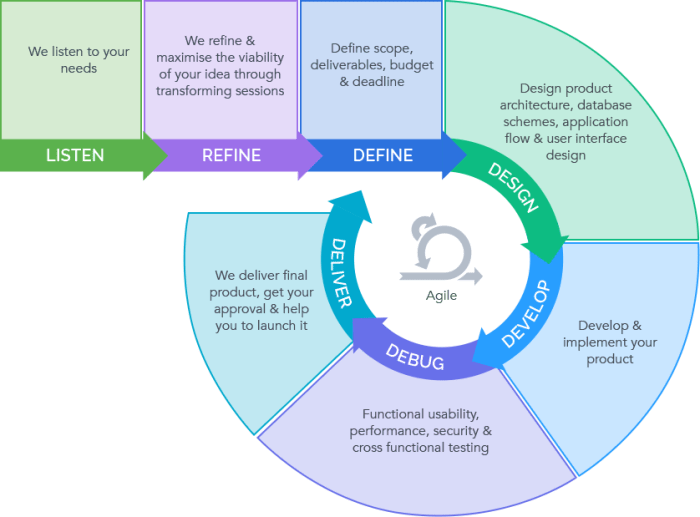In today’s global economy, businesses are increasingly turning to offshore software product development as a strategic way to enhance their capabilities while reducing costs. This article delves into the intricacies of offshore software development, its benefits, challenges, and best practices, ensuring a comprehensive understanding for both newcomers and seasoned professionals.

Source: akratech.com
What is Offshore Software Product Development?
Offshore software product development refers to the practice of hiring external software development teams located in different countries to create, enhance, or maintain software products. This approach allows companies to leverage global talent, reduce operational costs, and access advanced technologies.
The Evolution of Offshore Development
The concept of outsourcing has evolved significantly over the past few decades. Initially focused on manufacturing, the trend has shifted toward services, particularly in the tech space. Today, countries like India, China, and Eastern European nations have emerged as leading destinations for offshore software development, providing a mix of high-quality talent at competitive prices.
Benefits of Offshore Software Development
Engaging in offshore software product development offers numerous advantages, including:
- Cost Efficiency: By outsourcing to countries with lower labor costs, businesses can significantly reduce their development expenses.
- Access to Global Talent: Offshore development provides access to a diverse pool of skilled professionals with expertise in various technologies.
- Scalability: Companies can easily scale their development team up or down based on project requirements without the long-term commitment of hiring full-time staff.
- Faster Time to Market: With teams working across different time zones, projects can progress 24/7, helping companies launch products more quickly.
- Focus on Core Activities: By outsourcing software development, businesses can concentrate on their core competencies and strategic goals.
Challenges of Offshore Software Development
While there are many benefits, offshore development also presents certain challenges, such as:
- Communication Barriers: Differences in language and culture can lead to misunderstandings and misalignment in project goals.
- Quality Control: Ensuring consistent quality can be difficult when working with remote teams, necessitating stringent oversight and management.
- Time Zone Differences: Coordinating schedules across different time zones can complicate collaboration and project timelines.
- Security Concerns: Outsourcing can pose risks related to data security and intellectual property protection.
- Dependency on External Providers: Relying on third-party teams can create vulnerabilities if the vendor fails to deliver as promised.
Best Practices for Successful Offshore Software Development
To mitigate challenges and maximize the benefits of offshore software development, consider the following best practices:
1. Choose the Right Partner
Do thorough research to select a reputable offshore development company. Look for:
- A proven track record and client testimonials.
- Expertise in relevant technologies and industry experience.
- Transparent communication and collaboration practices.
2. Establish Clear Communication Channels
Effective communication is crucial for project success. Adopt tools and practices such as:
- Regular video meetings to discuss progress and resolve issues.
- Project management tools like Jira or Trello to track tasks and timelines.
- Clear documentation of requirements, specifications, and feedback.
3. Define Clear Objectives and Milestones
Set clear, measurable goals for the project, along with specific milestones to track progress. This helps align expectations and ensure accountability.
4. Focus on Quality Assurance
Implement robust quality assurance practices to ensure the product meets the desired standards. This may include:
- Regular code reviews and testing cycles.
- Setting up automated testing frameworks.
- Involving stakeholders in the QA process for feedback and approval.
5. Protect Your Intellectual Property
Safeguard your intellectual property by:
- Signing non-disclosure agreements (NDAs) with your offshore partner.
- Implementing strict data security protocols.
- Regularly auditing compliance with security standards.
Offshore Software Development Trends
As technology evolves, so do practices in offshore software development. Key trends include:
- Increased Adoption of Agile Methodologies: Agile development allows for adaptive planning and iterative progress, making it ideal for offshore projects.
- Emergence of AI and Automation: The integration of AI tools in development processes streamlines workflows and enhances productivity.
- Enhanced Cybersecurity Measures: With rising concerns over data breaches, offshore companies are investing in advanced security solutions.
- Remote Work Culture: The shift towards remote work has made offshore development more accessible and widespread.
Frequently Asked Questions (FAQ)
1. What countries are best for offshore software development?
Countries like India, China, Poland, Ukraine, and the Philippines are popular choices due to their skilled workforce and cost-effective solutions.
2. How do I choose the right offshore development partner?
Consider factors such as expertise, reputation, communication style, and client reviews when selecting a partner.
3. What are the risks associated with offshore development?
Risks include communication barriers, quality control issues, and security concerns. Proper management and due diligence can mitigate these risks.
4. How can I ensure the quality of the software developed offshore?, Offshore software product development
Implement regular quality assurance checks, set clear requirements, and involve stakeholders in the review process to maintain quality standards.
5. Is offshore software development suitable for startups?
Yes, offshore development can provide startups with access to skilled resources and reduced costs, allowing them to scale efficiently.
Conclusion
Offshore software product development presents a unique opportunity for businesses to enhance their operational capabilities while managing costs effectively. By understanding the benefits, challenges, and best practices, organizations can make informed decisions and successfully navigate the offshore development landscape.

Source: technologyally.com
If you’re considering embarking on an offshore software development journey, take the first step today! Reach out to a trusted offshore partner and explore how they can help bring your software vision to life.
Question Bank: Offshore Software Product Development
What are the main advantages of offshore software development?
Key advantages include cost savings, access to a broader talent pool, faster project completion times, and the ability to focus on core business activities.
How do I choose the right offshore development partner?
Evaluate potential partners based on their expertise, previous projects, client testimonials, and communication capabilities to ensure a good fit.
What challenges might I face with offshore development?
Common challenges include time zone differences, language barriers, and managing remote teams effectively.

Source: appsdevpro.com
Is offshore development suitable for startups?
Yes, many startups utilize offshore development to save costs and gain access to specialized skills without the overhead of hiring in-house teams.
How can I ensure quality in my offshore software projects?
Establish clear communication channels, set defined expectations, and implement regular progress reviews to maintain quality standards.
